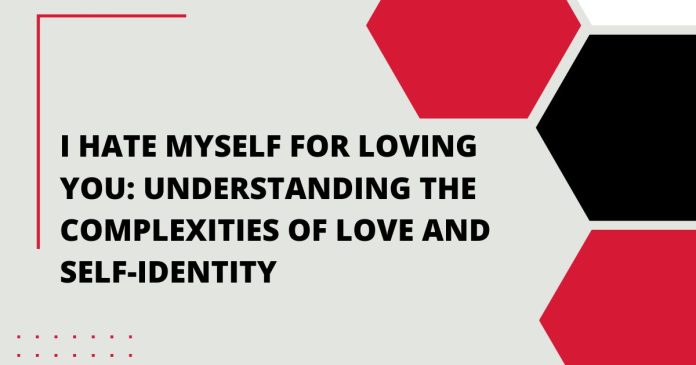Table of Contents
- Introduction
- The Paradox of Love
- The Struggle with Self-Identity
- How Love Influences Our Self-Perception
- Coping Mechanisms for Self-Hatred
- Seeking Professional Help
- The Power of Self-Compassion
- Embracing Self-Love
- The Role of Relationships
- The Healing Journey
- Breaking Free from Toxic Patterns
- Finding Support
- Conclusion
- FAQs
Introduction
I Hate Myself for Loving You: Love is often considered one of the most beautiful and profound human emotions. However, it can also be one of the most perplexing and challenging experiences. In this article, we will explore the intricate relationship between love and self-identity, particularly the feeling of self-loathing that can arise when we love someone deeply.
The Paradox of Love
Love is a paradoxical emotion. It can bring immense joy and fulfillment, yet it can also lead to feelings of pain and self-doubt. When we love someone deeply, we invest a part of ourselves in that person, making us vulnerable to their actions and emotions. This vulnerability can sometimes trigger self-doubt and self-criticism.
The Struggle with Self-Identity
Self-identity is the perception of who we are as individuals. When we love someone deeply, our self-identity can become intertwined with that person. We may start to define ourselves based on their opinions and actions, leading to a loss of our own identity.
How Love Influences Our Self-Perception
Love has a profound impact on how we perceive ourselves. When the person we love reciprocates our feelings, we often feel validated and worthy. Conversely, if they reject us or the relationship faces challenges, we may experience self-doubt and self-hatred.
Coping Mechanisms for Self-Hatred
Many individuals who struggle with self-hatred due to love employ coping mechanisms such as isolation, emotional detachment, or even self-destructive behaviors. These mechanisms can temporarily alleviate the pain but are not sustainable solutions.
Seeking Professional Help
If self-hatred becomes overwhelming, seeking professional help is crucial. Therapists and counselors can provide valuable guidance in understanding the root causes of self-loathing and developing healthier coping strategies.
The Power of Self-Compassion
Self-compassion is the practice of treating oneself with kindness and understanding, especially during challenging times. Learning to be gentle with ourselves can help mitigate self-hatred and promote emotional healing.
Embracing Self-Love
Ultimately, the path to healing involves embracing self-love. This means recognizing your worth as an individual, separate from any romantic relationship. It’s about prioritizing your well-being and happiness.
The Role of Relationships
Healthy relationships are built on mutual respect and support. If you find yourself in a relationship that continually fuels self-hatred, it may be necessary to reassess its dynamics and consider whether it’s worth pursuing.
The Healing Journey
Recovering from self-hatred is a journey that requires time and effort. It involves self-reflection, self-acceptance, and learning to love oneself unconditionally. It’s about breaking free from toxic patterns and building a positive self-image.
Breaking Free from Toxic Patterns
Identifying and breaking free from toxic patterns of thinking and behavior is essential for overcoming self-hatred. This may involve challenging negative thoughts, setting boundaries, and seeking professional support.
Finding Support
You don’t have to navigate the path of self-healing alone. Friends, family, or support groups can provide invaluable emotional support and encouragement.
Conclusion
In the complex interplay of love and self-identity, it’s common to experience moments of self-hatred. However, it’s essential to remember that self-love is attainable. By embracing self-compassion, seeking professional help when needed, and building healthy relationships, you can break free from the shackles of self-hatred and cultivate a deep love for yourself.
FAQs
- Is self-hatred a common experience in love? Self-hatred can be a common emotional response when love becomes challenging or unrequited. Many people experience it to varying degrees.
- How can I start practicing self-compassion? Begin by treating yourself with the same kindness and understanding that you would offer to a close friend. Challenge self-critical thoughts and practice self-care.
- Can self-love coexist with love for someone else? Absolutely. Self-love enhances your capacity to love others more fully and healthily.
- When should I seek professional help for self-hatred? If self-hatred is significantly affecting your daily life, relationships, or mental health, it’s advisable to seek the guidance of a therapist or counselor.
- What steps can I take to break free from toxic relationship patterns? Start by setting clear boundaries, communicating openly, and seeking professional guidance if the toxicity persists.

